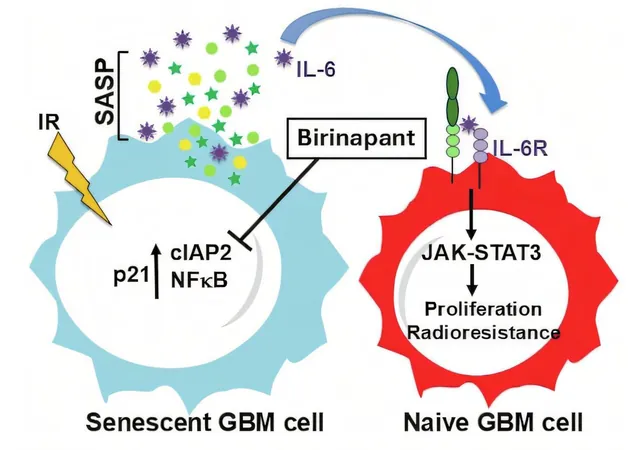
Groundbreaking Research Reveals New Hope in Fighting Glioblastoma Recurrence!
2025-03-26
Author: Sarah
Groundbreaking Research Reveals New Hope in Fighting Glioblastoma Recurrence!
Researchers from The University of Texas Health Science Center at San Antonio have made a monumental breakthrough in the battle against glioblastoma, one of the deadliest forms of brain cancer. Their study offers a glimmer of hope for patients, suggesting that new treatments could significantly delay or even block the cancer's recurrence after radiation therapy.
In a fascinating twist, the team discovered that the conventional treatment for glioblastoma—ionizing radiation—can inadvertently lead to tumor regrowth. The radiation generates senescent or aged cells, which secrete various molecules that can stimulate the growth of adjacent cancer cells. This paradox highlights the need for innovative approaches to manage glioblastoma recurrence more effectively.
Enter Senolytics
Enter the promising class of experimental drugs known as "senolytics." These drugs are designed to eliminate senescent cells while preserving healthy ones. The researchers’ findings indicate that administering these senolytic drugs after radiation can effectively kill the aging cancer cells, staving off the grim prospect of recurrence.
Dr. Sandeep Burma, a professor and vice chair of research in neurosurgery at UT Health San Antonio, emphasizes the potential of this "one-two punch" strategy. By utilizing radiation to induce senescence in tumor cells and then following up with senolytic therapy to eradicate those cells, patients may have a better chance at prolonged survival.
Study Overview
The study, titled "Targeting cIAP2 in a novel senolytic strategy prevents glioblastoma recurrence after radiotherapy," was published in the reputable journal EMBO Molecular Medicine. Alongside Dr. Burma, Dr. Bipasha Mukherjee also contributed significantly to this pivotal research, collaborating with fellow scientists from various departments and institutions, including the University of Texas Southwestern Medical Center and the Mayo Clinic.
A Dire Challenge
Glioblastoma is notorious for its rapid recurrence and aggressive nature, making it one of the most challenging cancers to treat. The recurrence often occurs sooner than anticipated, making ongoing research into its underlying mechanisms crucial. The scientists aim to dissect the role of therapy-induced senescence (TIS) as a potential driving factor for tumor regrowth.
Dr. Burma warns that while ionizing radiation remains an effective treatment for glioblastoma, it poses dual risks as it can both treat and contribute to the cancer's development. In fact, radiation exposure is the sole known risk factor for glioblastoma’s onset, further complicating treatment strategies.
The Dual Nature of Radiation
When tumors are subjected to radiation, cancer cells face two possible fates: they either perish or enter a state of senescence, which impedes their division. However, the newly identified senescent glioblastoma cells often release growth factors that can encourage nearby cells to proliferate again.
The Hopeful Solution
The term "senolytic" is derived from "senescence" and "lytic," meaning to destroy. The researchers pinpointed that the survival of senescent glioblastoma cells hinges on an anti-apoptotic protein known as cIAP2. By using a senolytic agent called birinapant in mouse models following radiation exposure, the researchers successfully eliminated these senescent cells without harming normal tissue.
Although birinapant alone was ineffective, it proved to be a game-changer when used as an adjuvant to radiation therapy, delaying or preventing tumor recurrence significantly in tested models.
As this groundbreaking research progresses, the medical community stands on the verge of potential new treatment pathways that could revolutionize how glioblastoma recurrence is managed, fostering renewed hope for countless patients facing this aggressive brain cancer. Can you imagine a future where glioblastoma isn't as frightening? Stay tuned as we uncover more developments!


 Brasil (PT)
Brasil (PT)
 Canada (EN)
Canada (EN)
 Chile (ES)
Chile (ES)
 Česko (CS)
Česko (CS)
 대한민국 (KO)
대한민국 (KO)
 España (ES)
España (ES)
 France (FR)
France (FR)
 Hong Kong (EN)
Hong Kong (EN)
 Italia (IT)
Italia (IT)
 日本 (JA)
日本 (JA)
 Magyarország (HU)
Magyarország (HU)
 Norge (NO)
Norge (NO)
 Polska (PL)
Polska (PL)
 Schweiz (DE)
Schweiz (DE)
 Singapore (EN)
Singapore (EN)
 Sverige (SV)
Sverige (SV)
 Suomi (FI)
Suomi (FI)
 Türkiye (TR)
Türkiye (TR)
 الإمارات العربية المتحدة (AR)
الإمارات العربية المتحدة (AR)